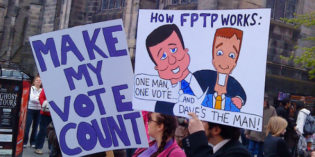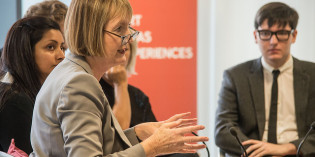Tag: Chris Terry

Local elections: diverse voices are being drowned out by the undemocratic voting system in England and Wales
England’s local councillors are elected under a First Past the Post electoral system with multi-member wards. As a result, Chris Terry argues, the results will be strongly non-proportional and so the system needs to be reformed.

75 more votes in the right places – that’s all the Conservatives would have needed to govern alone
If just 75 people in the right constituencies had voted differently in the 2017 General Election, Theresa May would now have a working majority in the Commons. Chris Terry (Electoral Reform Society) examines some of the more extraordinary anomalies thrown up by the first-past-the-post system this year. In North East Fife the SNP beat the […]

Who’s going to hold the new metro mayors to account?
Six English mayors will be elected on 4 May. They will enjoy extensive new powers. But who will hold them to account? Unlike in London, no directly-elected assembly will scrutinise the mayors’ action. Chris Terry warns that councillors need to step up to the role – and the method of electing councils themselves makes this deeply problematic. A […]

Ireland demonstrates that you can have both proportional representation and a constituency link
Ireland just held a General Election using an electoral system which, unlike the UK’s, has a proportional element. Here, Chris Terry argues that the Irish election provided strong evidence that candidate-centred (rather than list-centred) proportional representation using the Single Transferable Vote, and localised politics with a constituency link, can go hand-in-hand. Similar PostsLocal elections: diverse […]

The 2015 General Election was further proof that First Past the Post is not fit for purpose
The 2015 General Election produced an unexpected majority government, however it did so despite the rise of smaller parties such as the Greens and UKIP, who between them only won 2 seats, despite polling around 5 million votes. Chris Terry and Jess Garland argue that the result shows that the First Past the Post electoral […]

Britain’s voting system is partially responsible for holding back women’s representation
The proportion of women elected to parliament in the UK remains low compared to other countries. In this post, Chris Terry examines the gender balance of parliamentary candidates for the upcoming election, and concludes that some progress is being made. Nevertheless, he suggests switching to a system of proportional representation would increase the descriptive representation […]

Party system fragmentation is incompatible with our electoral system
The 2010 general election was notable in multiple respects, and will be recorded by history as the election which saw Britain’s first post-war coalition government. Yet, perhaps just as notable is the breaking of the record for the vote won by ‘other’ parties outside the big three of Labour, Conservatives and Liberal Democrats. In this […]

Strengthening the role of citizens and national parliaments in decision-making is key to solving the EU’s democratic deficit
The European Union has often been accused of having a ‘democratic deficit’. Ahead of the recent European elections, Chris Terry outlined proposals put forward by the Electoral Reform Society in the UK for improving EU democracy. Among other reforms, he suggests that improving the representativeness of MEPs by using open-list voting systems, increasing the accountability of the […]

In Britain’s first past the post electoral system, some votes are worth 22 times more than others
Britain’s electoral landscape is dominated by safe seats, with very little competition for votes taking place within them. New research, presented here by Chris Terry of the Electoral Reform society, shows the enormous differences between the ‘cost’ of votes in different constituencies, calling into question the premise that all votes are equal. Similar PostsBritain’s voting system […]


 Democratic Audit's core funding is provided by the Joseph Rowntree Charitable Trust. Additional funding is provided by the London School of Economics.
Democratic Audit's core funding is provided by the Joseph Rowntree Charitable Trust. Additional funding is provided by the London School of Economics.